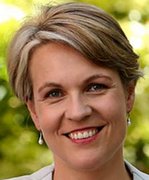The Green party, as do most other parties or groups, are driven by an innate human need to gain social acceptance amongst peers and build reputation and status. This drive underlies much of what people do.
The Greens are a party whose members and supports belong to a social milieu in which this type of moral signalling gains status and esteem. It just so happens that the Cultural Left do this by signalling their willingness to put the "other" before their own and give away what Western Civilisation has gained. They call this "progressivism" but it's nothing new, similar notions have existed in religion before. Just as before, people displayed their religious piety, their abstinence from sin and vice and denouncement of "heretics" for social status and inclusion in an almost exact manner in which people today display their Liberalism, their dislike of natural social and familial orders and denouncement of "racists" and "bigots".
Sarah Hansen Young cruising the Mediterranean to allow illegal entry of Africans into Europe is the ultimate in moral signalling.
Just as anyone who said anything which could be remotely interpreted as challenging to religious canon was a "heretic", so too do people today find those who say anything which could be remotely interpreted as challenging the religion of Political Correctness be branded a "heretic". Even the language used to justify this attitude is the same. The way that the religion is hostile to any interpretation of facts which doesn't fit their worldview is the same.
In the past, politicians have exploited religion to get the masses to do their bidding. The politicians using open borders mentality to support big business and Capitalists is the same.
That is to say, Sarah Hanson Young is adhering to a religion. In the past, many intelligent people supported theocracies and religious persecution. In a way, if doing so gained favour of those who had established power, this made sense, (in a social sense, not in a truth and reason sense).


Stalin comment needs retitling.
Excellent points, but you should retitle this so that people realise why you are posting it. Paul Craig Roberts is an international US based political commentator, isn't he. (More info would be good for our readers.) I suggest you retitle this, 'Paul Craig Roberts right on much,wrong on Stalin' or some such, James. Then tell us why we should read PCR on other stuff. Many people lack your global history perspective.